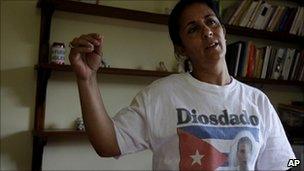Cuba to release political prisoner Diosdado Gonzalez
- Published

Mr Gonzalez's wife Alejandra Garcia is a founding member of the "Ladies in White"
The Roman Catholic Church in Cuba says the government has agreed to free a political prisoner, Diosdado Gonzalez, who had refused to go into exile.
His release would leave just five of 52 prisoners the communist authorities agreed to free last July still in jail.
The church said another eight prisoners who were not part of that group were also going to be released.
The US and EU have made the release of all political prisoners a condition for closer ties with Cuba.
"In continuation of the process of liberation of prisoners, we inform that the release from jail of Diosdado Gonzalez has been arranged," said Orlando Marquez, a spokesman for the office of the archbishop of Havana.
Mr Gonzalez, 48, was arrested in 2003 in a crackdown on opposition activists and sentenced to 20 years in prison.
His wife Alejandra Garcia is a founding member of the the Ladies in White opposition group that has been campaigning for the release of all political prisoners.
She said the head of the Catholic Church in Cuba, Cardinal Jaime Ortega, had telephoned to say Mr Gonzalez would soon be returning to their home in the city of Matanzas.
Struggle continues
"I feel nervous like a young woman waiting for her boyfriend to visit," she told reporters. "It has been eight years since my husband set foot in this house".
Ms Garcia added that she had spoken to her husband in prison and he had told her he was determined to stay in Cuba and continue to campaign for democratic change.
In a deal brokered by the church in July, Cuban president Raul Castro agreed to free all 52 of the dissidents still behind bars after the 2003 crackdown.
Most were released in the following weeks and sent into exile in Spain, but 11 - including Mr Gonzalez - stayed in jail because they refused to leave the island.
But earlier this month the authorities began releasing the remaining dissidents without insisting they go into exile.
In a separate announcement, the church said another eight prisoners who were not part of the agreement - including some convicted of violent crimes - were going to be released and sent into exile.
The Cuban government, which regards dissidents as criminals or US mercenaries working to undermine the communist state, rarely comments on their release.
On Thursday US President Barack Obama urged the immediate and unconditional release of all jailed dissidents in Cuba.
- Published24 February 2011
- Published13 February 2011
- Published11 February 2011